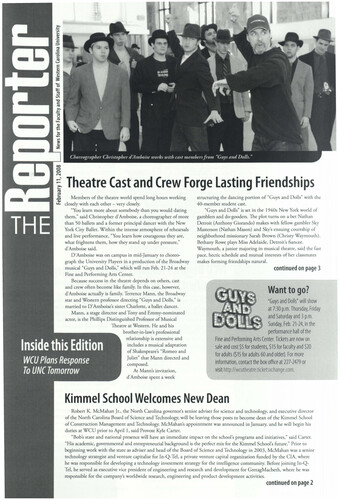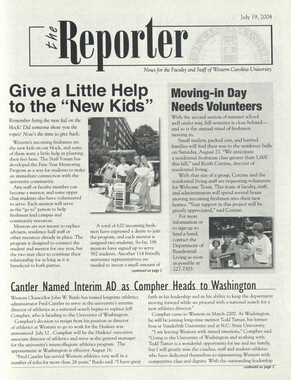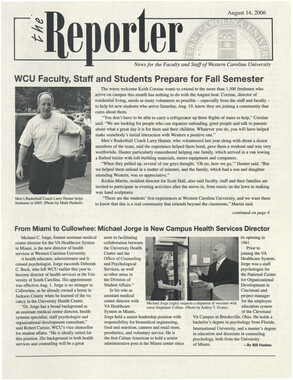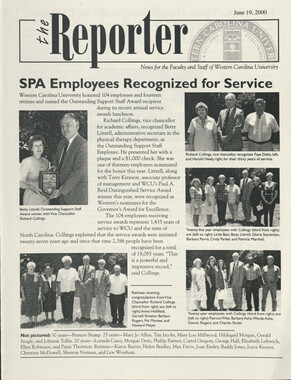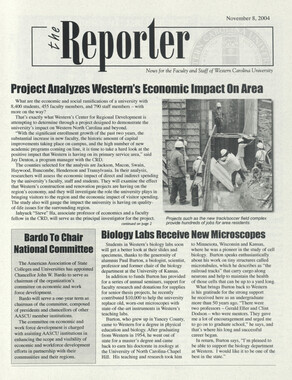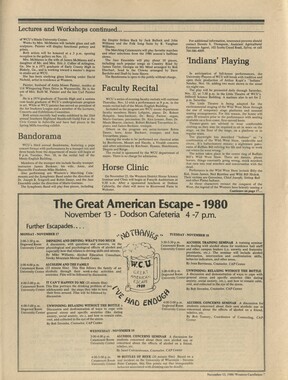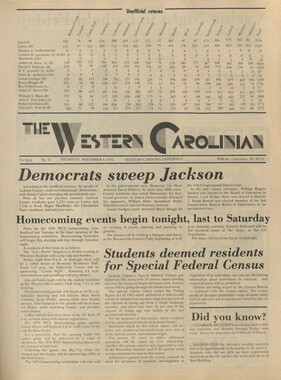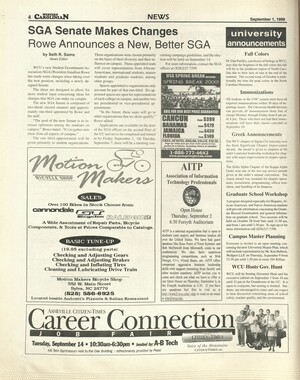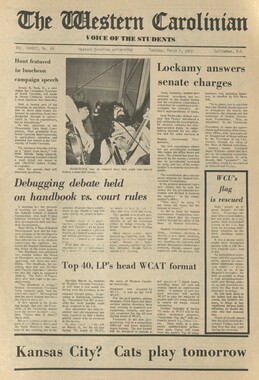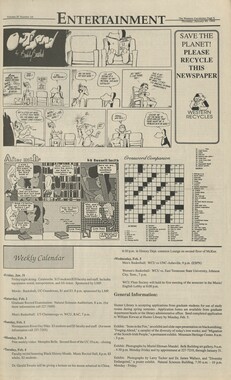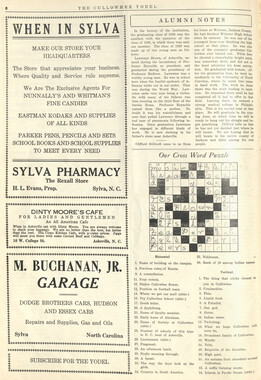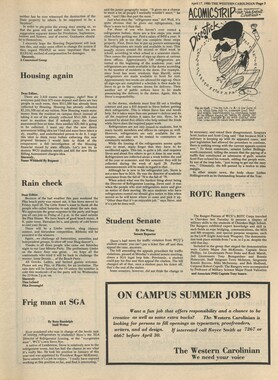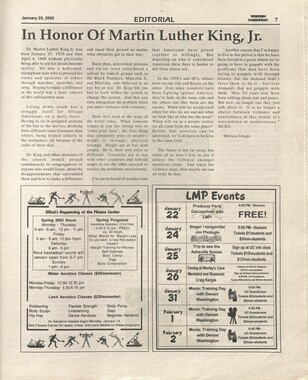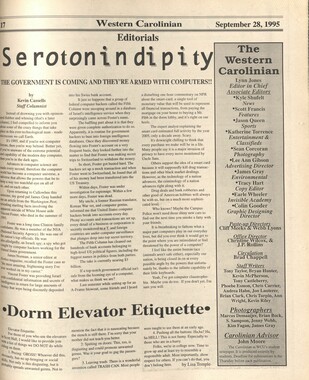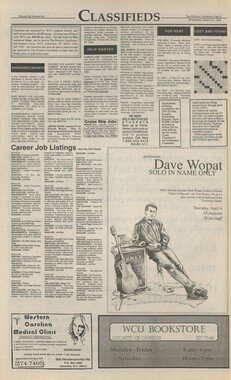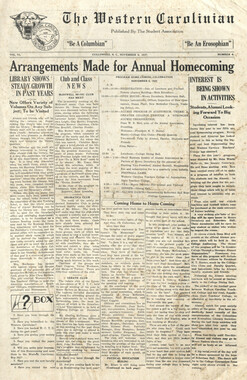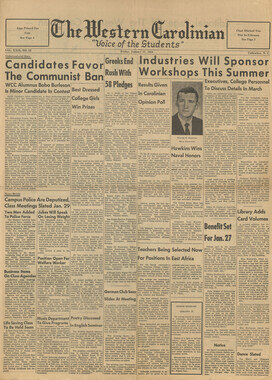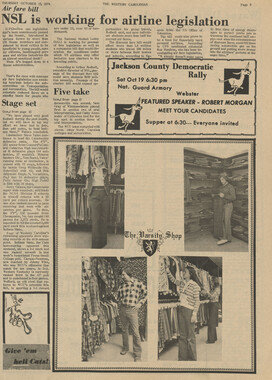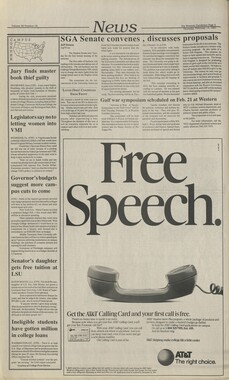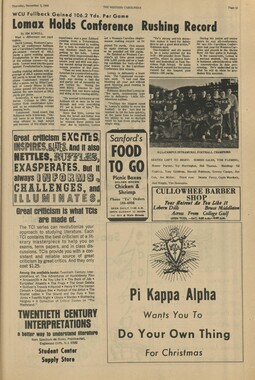Western Carolina University (20)
View all
- Canton Champion Fibre Company (2308)
- Cherokee Traditions (293)
- Civil War in Southern Appalachia (165)
- Craft Revival (1942)
- Great Smoky Mountains - A Park for America (2767)
- Highlights from Western Carolina University (430)
- Horace Kephart (941)
- Journeys Through Jackson (154)
- LGBTQIA+ Archive of Jackson County (26)
- Oral Histories of Western North Carolina (314)
- Picturing Appalachia (6772)
- Stories of Mountain Folk (413)
- Travel Western North Carolina (160)
- Western Carolina University Fine Art Museum Vitreograph Collection (129)
- Western Carolina University Herbarium (92)
- Western Carolina University: Making Memories (708)
- Western Carolina University Publications (2283)
- Western Carolina University Restricted Electronic Theses and Dissertations (146)
- Western North Carolina Regional Maps (71)
- World War II in Southern Appalachia (131)
University of North Carolina Asheville (6)
View all
- Allanstand Cottage Industries (62)
- Appalachian National Park Association (53)
- Bennett, Kelly, 1890-1974 (1388)
- Berry, Walter (76)
- Brasstown Carvers (40)
- Carver, George Washington, 1864?-1943 (26)
- Cathey, Joseph, 1803-1874 (1)
- Champion Fibre Company (233)
- Champion Paper and Fibre Company (297)
- Cherokee Indian Fair Association (16)
- Cherokee Language Program (22)
- Crowe, Amanda (40)
- Edmonston, Thomas Benton, 1842-1907 (7)
- Ensley, A. L. (Abraham Lincoln), 1865-1948 (275)
- Fromer, Irving Rhodes, 1913-1994 (70)
- George Butz (BFS 1907) (46)
- Goodrich, Frances Louisa (120)
- Grant, George Alexander, 1891-1964 (96)
- Heard, Marian Gladys (60)
- Kephart, Calvin, 1883-1969 (15)
- Kephart, Horace, 1862-1931 (313)
- Kephart, Laura, 1862-1954 (39)
- Laney, Gideon Thomas, 1889-1976 (439)
- Masa, George, 1881-1933 (61)
- McElhinney, William Julian, 1896-1953 (44)
- Niggli, Josephina, 1910-1983 (10)
- North Carolina Park Commission (105)
- Osborne, Kezia Stradley (9)
- Owens, Samuel Robert, 1918-1995 (11)
- Penland Weavers and Potters (36)
- Roberts, Vivienne (15)
- Roth, Albert, 1890-1974 (142)
- Schenck, Carl Alwin, 1868-1955 (1)
- Sherrill's Photography Studio (2565)
- Southern Highland Handicraft Guild (127)
- Southern Highlanders, Inc. (71)
- Stalcup, Jesse Bryson (46)
- Stearns, I. K. (213)
- Thompson, James Edward, 1880-1976 (226)
- United States. Indian Arts and Crafts Board (130)
- USFS (683)
- Vance, Zebulon Baird, 1830-1894 (1)
- Weaver, Zebulon, 1872-1948 (58)
- Western Carolina College (230)
- Western Carolina Teachers College (282)
- Western Carolina University (1794)
- Western Carolina University. Mountain Heritage Center (18)
- Whitman, Walt, 1819-1892 (10)
- Wilburn, Hiram Coleman, 1880-1967 (73)
- Williams, Isadora (3)
- Cain, Doreyl Ammons (0)
- Crittenden, Lorraine (0)
- Rhodes, Judy (0)
- Smith, Edward Clark (0)
- Appalachian Region, Southern (2399)
- Asheville (N.C.) (1917)
- Avery County (N.C.) (26)
- Blount County (Tenn.) (161)
- Buncombe County (N.C.) (1671)
- Cherokee County (N.C.) (283)
- Clay County (N.C.) (555)
- Graham County (N.C.) (233)
- Great Smoky Mountains National Park (N.C. and Tenn.) (510)
- Haywood County (N.C.) (3522)
- Henderson County (N.C.) (70)
- Jackson County (N.C.) (4692)
- Knox County (Tenn.) (25)
- Knoxville (Tenn.) (12)
- Lake Santeetlah (N.C.) (10)
- Macon County (N.C.) (420)
- Madison County (N.C.) (211)
- McDowell County (N.C.) (39)
- Mitchell County (N.C.) (132)
- Polk County (N.C.) (35)
- Qualla Boundary (981)
- Rutherford County (N.C.) (76)
- Swain County (N.C.) (2113)
- Transylvania County (N.C.) (247)
- Watauga County (N.C.) (12)
- Waynesville (N.C.) (73)
- Yancey County (N.C.) (72)
- Aerial Photographs (3)
- Aerial Views (60)
- Albums (books) (4)
- Articles (1)
- Artifacts (object Genre) (228)
- Bibliographies (1)
- Biography (general Genre) (2)
- Cards (information Artifacts) (38)
- Clippings (information Artifacts) (191)
- Crafts (art Genres) (622)
- Depictions (visual Works) (21)
- Design Drawings (1)
- Drawings (visual Works) (184)
- Envelopes (73)
- Facsimiles (reproductions) (1)
- Fiction (general Genre) (4)
- Financial Records (12)
- Fliers (printed Matter) (67)
- Glass Plate Negatives (381)
- Guidebooks (2)
- Internegatives (10)
- Interviews (812)
- Land Surveys (102)
- Letters (correspondence) (1013)
- Manuscripts (documents) (619)
- Maps (documents) (177)
- Memorandums (25)
- Minutes (administrative Records) (59)
- Negatives (photographs) (5835)
- Newsletters (1285)
- Newspapers (2)
- Occupation Currency (1)
- Paintings (visual Works) (1)
- Pen And Ink Drawings (1)
- Periodicals (193)
- Personal Narratives (10)
- Photographs (12976)
- Plans (maps) (1)
- Poetry (7)
- Portraits (1960)
- Postcards (329)
- Programs (documents) (151)
- Publications (documents) (2237)
- Questionnaires (65)
- Scrapbooks (282)
- Sheet Music (2)
- Slides (photographs) (402)
- Songs (musical Compositions) (2)
- Sound Recordings (796)
- Specimens (92)
- Speeches (documents) (15)
- Tintypes (photographs) (8)
- Transcripts (322)
- Video Recordings (physical Artifacts) (23)
- Vitreographs (129)
- Text Messages (0)
- A.L. Ensley Collection (275)
- Appalachian Industrial School Records (7)
- Appalachian National Park Association Records (336)
- Axley-Meroney Collection (2)
- Bayard Wootten Photograph Collection (20)
- Bethel Rural Community Organization Collection (7)
- Blumer Collection (5)
- C.W. Slagle Collection (20)
- Canton Area Historical Museum (2110)
- Carlos C. Campbell Collection (282)
- Cataloochee History Project (65)
- Cherokee Studies Collection (4)
- Daisy Dame Photograph Album (5)
- Daniel Boone VI Collection (1)
- Doris Ulmann Photograph Collection (112)
- Elizabeth H. Lasley Collection (1)
- Elizabeth Woolworth Szold Fleharty Collection (4)
- Frank Fry Collection (95)
- George Masa Collection (173)
- Gideon Laney Collection (452)
- Hazel Scarborough Collection (2)
- Hiram C. Wilburn Papers (28)
- Historic Photographs Collection (236)
- Horace Kephart Collection (861)
- Humbard Collection (33)
- Hunter and Weaver Families Collection (1)
- I. D. Blumenthal Collection (4)
- Isadora Williams Collection (4)
- Jesse Bryson Stalcup Collection (47)
- Jim Thompson Collection (224)
- John B. Battle Collection (7)
- John C. Campbell Folk School Records (80)
- John Parris Collection (6)
- Judaculla Rock project (2)
- Kelly Bennett Collection (1407)
- Love Family Papers (11)
- Major Wiley Parris Civil War Letters (3)
- Map Collection (12)
- McFee-Misemer Civil War Letters (34)
- Mountain Heritage Center Collection (4)
- Norburn - Robertson - Thomson Families Collection (44)
- Pauline Hood Collection (7)
- Pre-Guild Collection (2)
- Qualla Arts and Crafts Mutual Collection (12)
- R.A. Romanes Collection (681)
- Rosser H. Taylor Collection (1)
- Samuel Robert Owens Collection (94)
- Sara Madison Collection (144)
- Sherrill Studio Photo Collection (2558)
- Smoky Mountains Hiking Club Collection (616)
- Stories of Mountain Folk - Radio Programs (374)
- The Reporter, Western Carolina University (510)
- Venoy and Elizabeth Reed Collection (16)
- WCU Gender and Sexuality Oral History Project (32)
- WCU Mountain Heritage Center Oral Histories (25)
- WCU Oral History Collection - Mountain People, Mountain Lives (71)
- WCU Students Newspapers Collection (1744)
- Western North Carolina Tomorrow Black Oral History Project (69)
- William Williams Stringfield Collection (2)
- Zebulon Weaver Collection (109)
- African Americans (390)
- Appalachian Trail (35)
- Artisans (521)
- Cherokee art (84)
- Cherokee artists -- North Carolina (10)
- Cherokee language (21)
- Cherokee pottery (101)
- Cherokee women (208)
- Church buildings (167)
- Civilian Conservation Corps (U.S.) (110)
- College student newspapers and periodicals (1830)
- Dams (103)
- Dance (1023)
- Education (222)
- Floods (61)
- Folk music (1015)
- Forced removal, 1813-1903 (2)
- Forest conservation (220)
- Forests and forestry (921)
- Gender nonconformity (4)
- Great Smoky Mountains National Park (N.C. and Tenn.) (181)
- Hunting (38)
- Landscape photography (10)
- Logging (103)
- Maps (84)
- Mines and mineral resources (8)
- North Carolina -- Maps (18)
- Paper industry (38)
- Postcards (255)
- Pottery (135)
- Railroad trains (71)
- Rural electrification -- North Carolina, Western (3)
- School integration -- Southern States (2)
- Segregation -- North Carolina, Western (5)
- Slavery (5)
- Sports (452)
- Storytelling (245)
- Waterfalls -- Great Smoky Mountains (N.C. and Tenn.) (66)
- Weaving -- Appalachian Region, Southern (280)
- Wood-carving -- Appalachian Region, Southern (328)
- World War, 1939-1945 (173)
The Reporter, February 2008
-
The Reporter is a publication produced by Western Carolina University featuring news, events, and campus community updates for faculty and staff. The publication began in August of 1970 and continues digitally today. Click on the link in the “Related Mate
-
-
Theatre Cast and Crew Forge lasting Friendships Members of the theatre world spend long hours working closely with each other - very closely. "You learn more about somebody than you would dating them," said Christopher d'Amboise, a choreographer of more than 50 ballets and a former principal dancer with the New York City Baller. Within the intense atmosphere of rehearsals and live performance, "You learn how courageous they are, what frightens them, how they stand up under pressure," d'Amboise said. D'Amboise was on campus in mid-January to choreograph the University Players in a production of the Broadway musical "Guys and Dolls," which will run Feb. 21-24 at the Fine and Performing Arts Center. Because success in the theatre depends on others, cast and crew often become like family. In this case, however, d'Amboise actually is family. Terrence Mann, the Broadway star and Western professor directing "Guys and Dolls," is married to D'Amboise's sister Charlotte, a ballet dancer. Mann, a stage director and Tony and Emmy-nominated actor, is the Phillips Distinguished Professor of Musical Theatre at Western. He and his brother-in-law's professional relationship is extensive and includes a musical adaptation of Shakespeare's "Romeo and Juliet" that Mann directed and composed. At Mann's invitation, d'Amboise spent a week structuring the dancing portion of"Guys and Dolls" with the 40-member student cast. "Guys and Dolls" is set in the 1940s New York world of gamblers and do-gooders. The plot turns on a bet Nathan Detroit (Anthony Giorando) makes with fellow gambler Sky Masterson (Nathan Mason) and Sky's ensuing courrship of neighborhood missionary Sarah Brown (Christy Waymouth). Bethany Rowe plays Miss Adelaide, Detroit's fiancee. Waymouth, a junior majoring in musical theatre, said the fast pace, hectic schedule and mutual interests of her classmates makes forming friendships natural. continued on page 3 Want togo? "Guys and Dolls" will show at 7:30 p.m. Thursday, Friday and Saturday and 3 p.m. Sunday, Feb. 21-24, in the performance hall of the Fine and Performing Arts Center. Tickets are now on sale and cost $5 for students, $15 for faculty and $20 for adults ($15 for adults 60 and older). For more information, contact the box office at 227-2479 or visit http://wcutheatre.tiCketsxchange.com. Kimmel School Welcomes New Dean Robert K. McMahan Jr., the North Carolina governor's senior adviser for science and technology, and executive director of the North Carolina Board of Science and Technology, will be leaving those posts to become dean of the Kimmel School of Construction Management and Technology. McMahan's appointment was announced in January, and he will begin his duties at WCU prior to April l , said Provost Kyle Carter. "Bob's state and national presence will have an immediate impact on the school's programs and initiatives," said Carter. "His academic, governmental and entrepreneurial background is the perfect mix for the Kimmel School's future." Prior to beginning work with the state as adviser and head of the Board of Science and Technology in 2003, McMahan was a senior technology strategist and venture capitalist for ln-Q-Tel, a private venture capital organization funded by the CIA, where he was responsible for developing a technology investment strategy for the intelligence community. Before joining ln-QTel, he served as executive vice president of engineering and research and development for GretagMacbeth, where he was responsible for the company's worldwide research, engineering and product development activities. continued on page 2 Kimmel Dean continuedtromcover McMahan became affiliated with GretagMacbeth after that company's 2000 acquisition of McMahan Research Laboratories, an advanced technologies company that he founded in Cambridge, Mass., and later expanded to North Carolina's Research Triangle Park. McMahan earned bachelor's degrees in physics and the history of art from Duke University in 1982 and a doctoral degree in physics from Dartmouth University in 1986. He completed postdoctoral studies at the Harvard University/Smithsonian Astrophysical Observatory Center for Astrophysics. He also participated in research at the center that led to the discovery of the "bubble" structure of the universe and the "Great Wall," the largest known structure in the universe, both of which are now foundational elements of modern dark matter theory. "I have spent my career at the intersection of academia and business, and I couldn't be more enthusiastic about the opportunity to be part of a school that is charged with creating significant and dynamic educational opportunities for its students- our next generation of innovators - while at the same time forging flexible and diverse partnerships with businesses and organizations across the region to help build and shape the economy of Western North Carolina," McMahan said. - By RANDALL HOLCOMBE Newsfile Dr. Claire DeCristofaro, visiting associate professoro nursing, gave an invited presentation titled'Prevent100 of Cardiovascular Disease in Women' at the annual Southeastern Pharmacy Leadership Weekend confe~ in Asheville in January. The talk provided continwng education credit to audience members, who were composed of registered pharmacists and pharmacy technicians. Laura Chapman, training specialist with the Coulter Faculty Center/Faculty Sandbox, recently attended Apple Digital Media Training in San Jose, Calif. John LeBaron, the Jay M. Robinson Distinguished Professor in Educational Technologies with Coulter Fa<ulty Center, was the primary author of the chapter'PractiCal Strategies for Assessing the Quality of Collaborative Learner Engagement" in the recently published reference book "Computer-Supported Collaborative Learning: Best Practices and Principles for Instructors.' Co-authoring wrth LeBaron was Carol Bennett, a WCU doctoral candidate in educational leadership. David Dorondo, associate professor of history, has been elected to the board of the World Affairs Council ofWestern North Carolina, an independent nonprofit organ~at1on that works to advance international awareness and foster the region's global ties. Dorondo also will be lecturing on "Russia and Put in" as part of the council's winter Great Decisions lecture series. Highest Honors Finalists for the Chancellor's Distinguished Teaching Award, WCU Begins Planning Response to Needs Identified in UNC Tomorrow Report the highest teaching award bestowed by WCU, will be honored at a reception in Illusions at the University Center at 3:30p.m. Monday, Feb. 25. They are Kathleen Brennan, assistant professor of sociology; Jill Manners, associate professor and coordinator of clinical education for athletic training; Jane Nichols, assistant professor of interior design; Burton Ogle, associate professor and program director of environmental health; and Debby Singleton, visiting instructor of health, human performance and recreation. The winner will be announced at the General Faculty Meeting and Awards Convocation, which will be held at 3:30p.m. Friday, April25, in the Fine and Performing Arts Center. ~ Reporter- February 11 , 2008 About 200 members of the campus community gathered at a Jan. 31 forum to begin brainstorming how Western can respond to the needs of the state identified in a report recently released by the University of North Carolina Tomorrow Commission. The UNC Tomorrow initiative was launched to determine how the UNC system can respond more directly and proactively to the 21st-century challenges facing North Carolina now and in the future. The commission conducted a series of campus visits, community and faculty listening forums, surveys, blogging efforts and scholarly research, and its report will guide UNC's priorities, resources allocations, programming and planning. Groups discussed how WCU is addressing and could better address the 4 7 -page report's primary themes: enhancing global competitiveness; increasing access to higher education; helping solve public education challenges; enhancing economic transformation and community development; improving health and wellness; addressing energy and environmental challenges; and expanding outreach and engagement efforts. "Western is extremely well-positioned to respond to a lot of these needs," said Chancellor John Bardo. The forum was an early step in the process of preparing a preliminary response to the UNC Tomorrow report to send to the UNC General Administration by May I . A more detailed response will be submitted in the fall. Funding and budgeting decisions for institutions within the UNC system will be strongly linked to how they address the priorities in the UNC Tomorrow report, said Bardo. "This is a big deal -and a big job," he said. "The more people we can involve the better." The process will include formation of a diverse steering committee with members representing faculty, staff, students and representatives from counties in the region that WCU serves. Working groups will meet to discuss each of the report's major themes. A Web site with news and updates about WCU's response to the report wiU be developed, and additional campus forums will be held. "As soon as we get a draft response, we will sit down with Faculty Senate, the University Advisory Council and Staff Forum to ask for feedback," said Bardo. "I have never seen anything with as much potential to affect our future in a positive way as UNC Tomorrow." - By TERESA KILLIAN For more information, check out nctomorrow.org. Send additional thoughts about the report to John Bardo via e-mail at jbardo a'email.wcu.edu. Relay For Life WCU's Relay For Life event kickoff will be Wednesday, Feb. 13, in the Cardinal Room of A.K. Hinds University Center. All-night Relay For Life events will be April11 on campus and May 16 at Jackson County Recreation Park in Cullowhee. Students, Faculty, Staff Join Forces in Relay For Life When Newton Smith, associate chief information officer, was undergoing radiation rrearments in Atlanta for prosrare cancer, rhe Hope Lodge gave him a home and the facilities ro continue reaching classes online. ''I'm deeply indebred ro rhe American Cancer Society for the information they provided and rhe accommodations," said Smith. "They gave me the feeling thar l wasn't alone and rhar rhere was hope. Like everyone who hears those words, 'You have cancer,' l panicked ar firsr." Six years larer, Smirh is giving back through serving as honorary chair for WCU's Relay For Life, an event to celeb rare cancer survivors, remember rhose who have losr rhe barrie and support rhe American Cancer ociety. A campus kickoff will be hosred Wednesday, Feb. 13, ar 7 p.m. in the Cardinal Room of A.K. Hinds Universiry Center, and Cast and Crew continued from cover She also said having the opportunity ro work with Mann and d'Amboise was an incredible learning opportunity. Mann gives clear direction and allows students ro bring their own ideas ro rehearsal without allowing them ro lose focus, and d'Amboise has an instinct for playing ro srudenrs' strengths, she said. According ro Mann, treating srudents as though rhey are professionals is the besr training. "You musr arrive prepared. You must be prepared to change. You musr have razor-sharp focus, and it helps to understand the needs and wants of a director," Mann said. D'Amboise said he pushes students while at the same rime recognizing their existing technical capabilities and understanding what they do well. His rime with the students was short, yet rehearsals were long and the work was demanding - precisely the right atmosphere for bonds to develop. "And if! run into Christy 10 years from now in New York, I'm going to remember her really fondly as parr of the theatre family because of that," d'Amboise said. - By JILL INGRAM Smith will be a speaker at the celebration Friday, April 11 , in which relay ream members walk throughout rhe night on rhe University Center lawn. The ties between WCU and 2008 Relay For Life are many, with Smirh serving as honorary chair of the student-organized campus event; Stephanie Harwood, fre hman cancer survivor from Franklin, speaking at rhe kickoff; Lisa Duff, a WCU alumna and senior community manager for the American Cancer Society, assisting srudent organizers; and Danell Moses, a vis iring professor of business, co-chairing Jackson Counry's Relay For Life. Hundreds of srudents, faculty and staff are expected to participate or make a contribution ro the Cullowhee events, which rogether raised more than $130,000 last year. "We would love to see more students, faculty and staff join us or support our reams," said Kathleen Cummins, chair of the campus Relay For Life and a senior nursing major from Clemmons. And Moses encouraged those who cannot attend the campus event in April Nrwton Smith to participate May 16 in Relay For Life ar Jackson County Recreation Park in ullowhee. "We walk the track from 6 p.m. ro 6 a.m., remembering cl1at cancer never sleeps," she said. mith said he doesn't know anybody who isn't touched by cancer. "None of us know who will be next to be diagnosed," said Smith, whose father battled rhe disease. "That's why everyone needs to support the work of rhe American Cancer ociety." Police Chief Earns Doctorate Western has a new "chief doctor" on staff, or at least a new "chief Ph.D." Thomas Johnson, chief ofWCU's police department, recently joined a small group of police executives who hold doctoral degrees when he was awarded a doctorate in instructional systems and work force development from Mississippi Stare University. "It is a huge accomplishment," said Don Fisher, chief of police in Laurel Park and immediate past president of the North Carolina Association of Chiefs of Police. Fisher said it is relatively common ro hear of police chiefs who have earned their master's degrees, bur rare to hear of chiefs who earned their doctorates. Johnson said the achievement fulfilled a more rhan 20-year-old dream. "Before moving into law enforcement on college campuses in 1986, I worked for a police chief named Alfred J. Winfield who was very progressive and educarion-orienred," said Johnson. "He was a rrue friend and mentor, and afier he earned his doctorate, it was in the back of my mind that I wan red ro, also." As part of Johnson's dissertation, he developed several online training courses thar used a variety of rools such as video accompanied by workbooks for students ro complete as they watched. "I saw exploring this ropic as a way of giving back to the profession," said Johnson. "FBI statistics show more rhan half of the nation's local police departments employ fewer than 10 sworn officers. In many cases, smaller agencies are isolated from training facilities and face budger challenges for training, Tom]ohmon and effective distance education could really make a difference ro rhem." Johnson joined Western as police chief in July 2005 afier serving in rhe same position with Mississippi Srare. Though Johnson now has an additional credential thar could help him land a position reaching ar the university level - a move he has seen fellow officers make over the years afier completing their doctorates- he says the job he wants is the one he has righr now. "When you look at the leaders in our country in industry or politics, the common denominator is higher education," said Johnson. "I believe in whar colleges and universities do, and whar we do in rhe university police department is critical ro creating a safe environment in which ro obrain an education." - By TERESA KI LLIAN iii Reporter - February 11, 2008 ~Raportar 0. February 11-24 --- Tuesday, Feb. 12 Coaches luncheon-WCU basketball discussion. $. RSVP. 11:45 a.m. Hospitality Room, RRAC. (227-7338) living with the land Folklife Series-The Cherokee Plant Center and Seed Project, speakers Sarah McClellan and Kevin Welch. 5:30p.m. Auditorium, MHC. (227-7129) African-American Film Festivai-"Jason's Lyric," 1994 drama set in the dangerous neighborhoods of Houston. 7 p.m. Theater, UC. (227-2276) Catamount Concert Series-Woodwind faculty recital, including Eldred Spell, fiute; Terri Armfield, oboe; Shannon Thompson, clarinet; ian Jeffress, saxophone; Will Peebles, bassoon; Travis Bennett, horn; and guest artist Vance Reese, piano. 8 p.m. RH. (227-7242) Wednesday, Feb. 13 French Film Festivai-"Le Retour de Martin Guerre," suspenseful film set in 16th century France. 7 p.m Room 121, McKee. (227-3872) Relay For life-Kickoff, speaker WCU student and cancer survivor Stephanie Harwood. 7 p.m. Cardinal Room, UC. (800-237-2345) Thursday, Feb. 14 Presentation-Artist Ken Sedberry leads clay forming demonstrations 9:30 a.m.-noon, Room 151, FA PAC; clay forming and decorating demonstrations 1:30-4 p.m., Room 151, FAPAC; slide presentation 5-6 p.m., Room 223. FAPAC. (227-3595) Saturday, Feb. 76 Workshop- "Hi-Definition Workfiow- From Stage to Screen," led by veteran cinematographer Barry Braverman. 9 a.m. Sound and television studios, CAl (227-2324) lady Catamount basketball-vs. Wofford.$. 4 p.m. RRAC. (227-7338) Monday, Feb. 18 lady Catamount basketball-vs. Furman.$. 7 p.m. RRAC. (227-7338) Tuesday, Feb. 19 Coaches luncheon-WCU basketball discussion. $. RSVP. 1145 a.m. Hospitality Room, RRAC. (227-7338) African-American Film Festivai-"Harlem Nights," comedic Eddie Murphy film about confiict between the mob and Harlem nightclub owners. 7 p.m. Theater, UC. (227-2276) Wednesday, Feb. 20 French Film Festivai-"Bande a Part," an intertwining expose of love, murder and robbery. 7 p.m. Room 121, McKee. (227-3872) 4 ~Reporter- February 11, 2008 To read or post additional university announcements, check out announcements.wcu.edu. Thursday, Feb. 27 Old Time Music and Bluegrass Jam-Open jam. 7 p.m. Auditorium, MHC. (227-7129) Catamount basketball-vs. UNC Greensboro.$. 7:03p.m. RRAC. (227-7338) Thursday, Feb. 27-Sunday, Feb. 24 Theatre- "Guys and Dolls," directed by Terrence Mann.$. Thursday-Saturday 7:30p.m.; Sunday. 3 p.m. FAPAC. (227-2479) Friday, Feb. 22 Catamount tennis-vs. Kennesaw State.$. 3 p.m. CAC. (227-7338) Saturday, Feb. 23 Open House-for prospective students and their families. (227-7317) lady Catamount basketball-vs. Georgia Southern.$. 12:30 p.m. RRAC. (227-7338) Catamount tennis-vs. Mercer.$. 2:30p.m. CAC. (227-7338) Catamount basketball-vs. The Citadel.$. 7:03 p.m. RRAC. (227-7338) Sunday, Feb. 24 Southern Stews Presentation and TastingKentucky Burgoo, presented by Joe Parker Rhinehart of Webster. 2 p.m. Auditorium, MHC. (227-7129) KEY: $-Admission fee; BB-Belk Building; CAC-Catamount Athletic Center; CAT-center for Applied Technology; CCB-(ordelia Camp Building; esc -Catamount Softball Complex; FA PAC -Fine and Performing Arts Center; HA-Hoey Auditorium; HFR-H.F. Robinson Administration Building; Hl- Hunter library; HS/CF-Hennon Stadium/Childress Field; MHC-Mountain Heritage Center; NSANatural Sciences Auditorium; RH-Recital Hall, Coulter Building; RRAC -Ramsey Regional Activity Center; UC - A.K. Hinds University Center; WS/BW-Whitmire Stadium/Bob Waters Reid. Submissions: Send news items. calendar notices and address changes to \VCU Calendar. 420 H.F. Robinson Building. Western Carolina University. Cullowhee. NC 28723 or e·mail to: Reporter@email.wcu.edu. Submit items for the university S online calendar at least one week prior to the evenl. Exhibits Ken Sedberry leads clay forming demonstrations, Feb. 14 Mountain Heritage Center SLIDESHOW SPOTLIGHT FOR FEBRUARY: "New threads in old patterns.' lobby: "Airing of the Quilts."Through March 31. "People of the Land: Rivercane Series.' Ongoing. Gallery A: "Migration of the Scotch-Irish People.' includes text panels, illustrations, artifacts and vibrant murals that trace the Scotch-Irish Appalachian settlers from Ulster to Pennsylvania, through the Shenandoah Valley, and into Western North Carolina. Permanent exhibit. Gallery B: "Southern Stews: Traditions of One-Pot Cooking; a national, traveling exhibition organized by the McKissick Museum at the University of South Carolina. Through March. Online Exhibits (http:/ /www.wcu.edu/2397.asp) "Aher the Wa( "Horace Kephart: Revealing an Enigma" "Southern Appalachian Quilts" "Watts in the Mountains: Rural Electrification in Western North Carolina" "Craft Revival: Shaping Western North Carolina Past and Present" Mountain Heritage Center hours: 8 a.m.-5 p.m. Monday-Friday. (227-7129 or http:/ /www.wcu.edu/2389.asp) Fine Art Museum, Fine and Performing Arts Center ONGOING EXHIBIT: "Worldviews.'Selections from Western Carolina University's permanent collection in all media by local, regional, national and international artists. School of Art and Design Biennial Faculty Exhibition. Through March 15. Fine Art Museum hours: Tuesdays, Wednesdays and Fridays 10 a.m.-4 p.m.; Thursdays 10 a.m.-6 p.m.; Saturdays 1-4 p.m. Donations appreciated. (227-3591 or http:/ /fapac.wcu.edu) Hunter Library Exhibition of Faculty and Staff Works. Through Feb. 15. Forensic Professors and Students Assist at Crime Scene "QEP: Crime Scene" might be a good tide for a primetime television program based on a recent example of Western's new institutional focus on engaged learning and high levels of faculty-student interaction. Forensic anthropology professors and students assisted law enforcement agencies in their search for clues in a remote area of national forestland where the body of a hiker missing since October was discovered in early February. Under the guidance of Cheryl Johnston and John Williams, the team combed through a rugged section ofNantahala National Forest in Macon County to help investigators properly identifY skeletal remains. Williams, Johnston and fellow faculty member Jane Brown were joined by four WCU students on the daylong search. "The area where the remains were found is apparently a place where hunters often dump animal carcasses," said Williams. "We helped search the area, locating skeletal remains and helping local law enforcement determine whether the bone is animal or human." In addition to providing a valuable service to law enforcement officers in one of the nation's most high-profile criminal cases, the activity also provided real-world, hands-on experience to students in the forensic anthropology program. Professors and students working side by side on projects that benefit local agencies or help solve regional problems has become an institutional focus at Western. The university's recently adopted Quality Enhancement Plan, or QEP, calls for strong links between students' classroom and extracurricular activities, while a new policy for tenure, promotion and reappointment is designed to reward faculty members for extending their expertise beyond the campus. Law enforcement officials said they are happy to have such expertise so close at hand. Western's campus in Cullowhee is located about 40 miles from the scene of the investigation. "Dr. Williams and his laboratory have been extremely helpful to us - not just in this case, but any time we have needed assistance in identifYing possible remains," said Lt. Brian Leopard of the Macon County Sheriffs Office. "They've always dropped whatever they were doing to help us in our investigations. Dr. Williams and his team greatly speed up the process, and they help eliminate a lot of false leads. It is a valuable asset to the law enforcement community to have this facility and this expertise here in Western North Carolina." Authorities say the human remains found in Macon County on Feb. 2 are those of]ohn Bryant, an 80-year-old man from Horse Shoe who disappeared with his wife, Irene, while hiking in the Pink Beds area of Pisgah National Forest on Oct. 21. Law enforcement officers had been on a multi-state search for the missing man since the body of his wife was found in November not far from their parked vehicle. Law enforcement officers say they consider Gary M. Hilton, a drifter who pleaded guilty in January to the murder of hiker Meredith Emerson in the woods of northern Georgia, a leading suspect in the Bryants' deaths. Investigators in Florida also are looking at Hilton in the murder of a hiker in the Apalachicola National Forest. Although the Western Carolina Human Identification Laboratory has assisted in numerous investigations since its inception in 2003, the Bryant case is the highest-profile assignment so far. -By BILL STUDENC SMOKE OUT? Tougher Smoking Policy Considered for Campus A new stare law prohibited smoking in all campus buildings starting Jan. I , and another law enabl universities ro create nosmoking zones around campus buildings up to 100 feer. The question is, should Western? Laura Cruz, assistant professor of history, suspects a lor of p ople would like ro see ir happen. Cruz, a smoker, has heard faculty members describe walking past people smoking near entrances as "running rhe gauntlet." If nonsmoking areas are cr ared around buildings, ruz requests chat the university also designate smoking areas, preferably with a shdt rand cigarette receptacles, so she can smoke without bothering others. "I know smoking is a terrible habit, but I try ro be as police as humanly possible about it," she said. A range of policies have been adopted at other University of North arolina schools. UNC hapel Hill enacted in January a 100-foor nonsmoking buffer around campus buildings, which effectively made the campus almost smoke free. Appalachian Stare University implemented a 50-foor nonsmoking buffer around campus buildings. East arolina University created 25-foot smoke-free zones around buildings as a step toward becoming a tobacco-free campus. UN - harlotte recently announced plans to enact in July a 25-foot nonsmoking area around campus buildings. At Western, Chancellor John W. Bardo has asked students, faculty and staff for their recommendations, and a series of forums to discuss the issue are being held with a campuswide Town Hall open to students, faculty and staff planned for 3 p.m. Monday, March 10, in the theater of A.K. Hinds University Center. Planning for WCU's Town Hall began in Staff Forum, and the event is being sponsored by the University Advisory Council and Wellness Center. Results will be forwarded to the chancellor. Town Hall Share your thoughts about whether WCU should enact a 25-foot, 50-foot, 75-foot or 1 00-foot no-smoking zone around campus buildings at 3 p.m. Monday, March 10, in the theater of A.K. Hinds University Center. ii1Reporter- February 25, 2008 So far, Terry Riouff, chair of the University Advisory Council; Richard Beam, chair of Faculty Senate; and Jed Tate, chair of raff Forum, said they have heard mostly from nonsmokers interested in creating smoke-free areas. "We haven't heard from many smokers at all, so I hope they come to the Town Hall," said Tate. "We really need to get everyone's input on this issue, and the Town Hall is the time to do that." Beam said there are no simple solutions. "Should we spend money to build shelters where people are allowed to smoke?" he asked. "If we do, and it is further away from buildings, how does that affect the timing and length of breaks for staff members? How will moving cigarette receptacles away from buildings affect litter and work for our grounds crew?" Earlier this semester, Cruz made an effort to smoke I 00 feet away from buildings. "I ended up on the sidewalk along the road, but then it seemed like a worse place to stand - a place where people walk and run for exercise," said Cruz. Danell Moses, visiting professor of business and co-chair of Jackson County Relay For Life, said she makes an extra effort to avoid second-hand smoke, even if it means walking a different way or speeding up or slowing down as she walks on campus. "I can't stand the smell of cigarette smoke anymore," said Moses, a former smoker, who supports creating designated smoking areas away from building entrances or busy sidewalks and boosting efforts on campus to raise awareness of health risks associated with smoking and increasing support for smoking cessation. Cyndi Ammons, an administrative assistant in student affairs, is a smoker who is trying to quit. Ammons recommends banning smoking at the main entrances of buildings and creating clearly marked areas where smokers can go on their breaks, and she does not think people who smoke deserve more or longer breaks than anyone else. "I think you should take breaks as designated in your department ro smokt or do whatever it is you need ro do," said Ammons. Breaks are a privilege, nor an entitlement, and supervisors are responsible for approvmg and moniroring them, said Karhy Wong, director of human resources. Other universities have implemented no-smoking policies through increasing signage and publicity about the policy and boosting availability to smoking cessation classes and programs. WCU would be eligible for grant money ro help implement a tougher no-smoking policy, said Karrie Joseph, wellness coordinator. "We know from other schools char if a policy is passed, i r works well ro post signs and announce the upcoming change to give people a lot of lead time to prepare ro make the transition," said Joseph. "More education and less policing seems robe the be r way to go." - By TERESA KILLIAN Survey Says ... The National College Health Assessment conducted at WCU in fall2007 revealed: - Students estimated that 66 percent of students smoke cigarettes every day. - Less than 7 percent of students reported smoking cigarettes every day in rhe past 30 days. - Nearly 80 percent of students said they had not smoked a cigarette within the last 30 days. In the 2004 survey, only 63 percent of students reported not smoking a cigarette within the last 30 days. Western Named to National Community Service Honor Roll The Corporation for National and ommunity Service named WCU ro the Pres ident's Higher Education Community ervice Honor Roll in February for exemplary service-learning efforts and leadership in building a "culture of civic engagement." "Service learning rhar improves rhe quality of our students' education while benefiting the people of our region is ar rhe very hearr of what rhis university is all about, and I am proud ro see those efforts recognized ar the national level," said Chancellor John W Bardo. "To be on rhe honor roll says rhar we are moving in rhe right direction. We will continue to improve our abilities in service learning and engagement." Launched in 2006, rhe President's Higher Education Community Service Honor Roll is the highest federal recognition higher education institutions can achieve for commitment ro service learning and civic engagement. During rhe 12-monrh period ending June 30, 2007, rhe service period considered for this year's award, 7,300 students at WCU completed 38,500 hours of community service, and 2,500 of rhose students participated as parr of rheir academic courses, said Glenn Bowen, director of service learning. As parr of Make a Difference Day, rhe university's Jacob Medford Service Learning Scholars served as sire leaders and coordinated social activities for residents of Mountain Trace Nursing Home in Webster, and assisted with the Pumpkinfesr cultural festival in Franklin and a fund raising kickoff for Sylva's Bridge Park Project. Also during rhe year, students provided 5,500 hours of community service rhrough rhe North Carolina Activating Citizenship rhrough Service (NC-ACTS) AmeriCorps Program; organized a campus Relay For Life rhat raised $21,000 for rhe American Cancer Society; and mobilized 622 volunteers for the Tuckaseigee River Cleanup, which helped North Carolina Campus Compact exceed a goal of mobilizing 500 volunteers statewide for National and Global Youth Service Day. "We appreciate and value rhis recognition," said Bowen. "Iris emblematic of our institution's commitment to community Story Collection by Ron Rash Named 'Notable' Book for 2007 "Chemistry and Orher Stories," a compilation of 15 short stories by Ron Rash, rhe Parris Distinguished Professor of Appalachian Culture ar Western Carolina University, has been named one of 15 "notable books" of 2007 by The Story Prize committee. The Story Prize is presented annually to recognize the aurhor of a book-lengrh work of shorr fiction judged as rhe nation's best. The top award of $20,000 is rhe largest literary prize in rhe nation. The prize committee this year also selected 15 notable books from rhe total of74 books entered. Contest officials said of Rash's book: "The Appalachian Mountains is rhe setting of rhis beautifully crafted collection rhar begins and ends wirh a fish and spans several generations in an isolated region wirh characters as craggy as rhe landscape." Rash's collection of stories was published last year by Picador. His most recent novel, "The World Made Straight," earned him the Sir Walter Raleigh Award for 2006 and was named one of the nation's top I 0 books for teenage readers by rhe Young Adult Library Services Association. Rash's earlier prize-winning novels include "Saints at rhe River" and "One Foot in Eden." His poetry and fiction have appeared in more than I 00 journals, magazines and anthologies. Rash's next novel, "Serena," will be published in September by Harper-Collins Press. - By RANDAll HOlCOMBE service as a vehicle for civic engagement. Our faculty, staff and especially our srudents are to be commended for their participation and support of our community service initiatives." Carol Burton, assistant vice chancellor for undergraduate studies, said Wesrern's inclusion on the President's Honor Roll is a testament to "the ourstanding work accomplished by Dr. Glenn Bowen, his staff and our students, and community partners reap rhe benefits of their efforts." Provost Kyle Carter also said he was extremely pleased to see Western receive rhe honor. "This award recognizes rhe work and effort of a lor of people - members of our faculty; Glenn Bowen, who leads service learning efforts at Western; and Bob Caruso, who retired last year as vice chancellor for student affairs," said Carter. "Bob promoted service learning ar Western, and his foresight and vision enabled us to receive rhis award." - By TERESA KilLIAN ~Reporter - February 25, 2008 3 Students Gain Experience as Professor is Interviewed for History Channel, A&E A faculty member's research into "oudaw" motorcycle clubs recenrly led roan opportunity for a group ofWCU broadcasting srudenrs ro gain valuable experience working behind rhe scenes on documenraries being filmed for The History hannd and Arrs & Enrerrainmenr Nerwork. William Dulaney, assisranr professor of communication and director of human communication, has conducted extensive research into ourlaw motorcycle clubs, and actually spenr I 0 years riding with one. Dulaney chronicled the process of becoming a member of an ourlaw club for his doctoral disserrarion at Florida Stare University, and he also has published articles and book chapters on rhe subject. History Channel producer Bernie Dudek inrerviewed Dulaney on Wednesday, Jan. 23, for a documentary ro show on rhar channel focusing on rhe Ourlaws Motorcycle Club, and footage also was shot for an Arrs & Entertainment "Biography" program about rhe Hells Angels Motorcycle Club. The all-clay raping session ar rhe Wheels Through Time motorcycle museum in Maggie Valley was supervised by Par Acheson, WCU assistant professor of communication and director of studio operations. Six WCU srudenrs ~ Reporter- February 25, 2ooa who are majoring in communication, wirh a concenrrarion in broadcasting, rook care oflighring and sound on rhe set and ran rhe second camera. Footage shot by rhe students will be edited into rhe program, Acheson said. orne of rhe participating students are affiliated with TV62, rhe university's srudenr-operared cable television unit, and rhey shor additional footage rhar will be seen later this semester on C hannel 62, Acheson said. Acheson said involvement in projects such as rhe documentaries provides many benelirs ro students, in addition to rhe rhrill of working on a program rhar millions of TV viewers will watch and seeing rheir names listed in rhe program credits. "Our students are able ro make contacts - to begin nerworking - wirh professionals who may employ rhem. Srudenrs are Newsfile Gurney ~hambers~ dean emeritus of t!1f Collegt of EducatiOn and Allied Professions, re<entty received the Dr. John M. Davis Distinguished Educational Achievement Award from t!1f Southern Association of Colleges and Schoo~ Council on Accreditation and S<hoollm~ Chambers was selected based on his long-stand ing contribution to SACS-CASI. distingu~hed and dedicated service to education, significant im~ on the educational profession, and reputation ill an innovator and facilitator for education change and improvement. Jeanne Dulworth, visiting assistant professor of social work, made a presentation on 1aking the Leap: How to Add Service-Learning Components and Assessment to Courses' at North Carolina Campus Compact's 10th Annual Service-Learning Conference in February at Elon Univer5ity. Glenn Bowen, director of service learning, also co-presented "An Agenda for Service-Learning Faculty Development and Persistence.' Elizabeth Heffelfinger, assistant professor and coordinator of the motion pictures study program in English; Laura Wright, assistant professor and director of graduate studies in English; and four students presented at the British Commonwealth and Postcolonial Studies Conference in February. The conference encompassed all aspects of countries formerly colonized by Britain and other European powers, from creative arts to econollllcs. able to apply rhe skills they learn in class ro commercial venrures, nor just classroom exercises," Acheson said. "They learn what real working conditions are like - leaving campus on a cold, foggy morning ar 6:45 a.m. robe on location, and on rime," he said. The History Channel documenrary will be broadcast in April, and rhe A&E Biography program will be shown later in the year. - By RANDALL HOLCOMBE Center for Rapid Product Realization Hires Principal Scientist Patrick Gardner, a former U.S. Air Force engineer, has joined the WCU Center- for Rapid Product Realization as irs first prinipal scientist. His responsibilities include identifying ourside funding and developing new technology, chen marching technologies with businesses best able co capitalize on any related commercial potential. Gardner's depth made him a natural for che position, said Phillip Sanger, director of the center. "His knowledge of technology, as well as his ability co deal with the business end of a new product, make him the perfect fir for this job," Sanger said. "He brings to rhe job a wealth of experience." Gardner holds doctorate and master's degrees in electrical engineering from the Air Force Institute ofTechnology, both with a heavy emphasis on physics. He retired from the Air Force as a lieutenant colonel after 25 years of active-duty service, where his responsibilities included research, development, acquisition and testing of aircraft control systems, munitions guidance, electro- optical sensors and chemical, biological, radiological and explosives detectors. In 2003, he joined the General Dynamics Corp. as chief scientist for detection and countermeasures. There he directed a ream of chemises, biologists and engineers in the development of chemical, biological and explosive systems, as well as infrared threat detection and counterexplosives. Gardner, who also holds the position of associate professor of electrical engineering in the Kimmel School's department of engineering and technology, started his work at Western in the fall. One of Gardner's first pcojecrs is refining a process that uses three-dimensional technology co scan feet and create models as part of an overall plan co create orthopedic insertS for people with podiatric trouble, such as individuals who have diabetes or foot and ankle problems. While orthotics are not new, the method is. Gardner is conducting the project with a $10,000 grant he received from the Carolina Photonics Consortium. Gardner said he will attempt to transition the process to podiatry and orthopedic clinics. "It's not a huge project but I think it has some huge potencial for the region," he said. Gardner and his wife, Katerina, moved to the area from Charlotte. The couple has five grown children and two grandchildren. -By JILL INGRAM Sustainability Pilot Project to be Tested at WCU Energy Manager Lauren Bishop says WCU will identify proactively ways to become more sustainable through participating in a pilot study of a new system designed to measure and compare sustainability at colleges and universities. WCU is the only North Carolina institution among the 91 colleges and universities in the United States and Canada selected to rest the Suscainability Tracking, Assessment and Rating System, or STARS, recently developed by the Association for the Advancement of Sustainability in Higher Education. "There is currently no system that adequately enables colleges and universities to comprehensively measure and easily compare their sustainability," said Bishop. AASHE defines suscainability as promoting human and ecological health, social justice, secure livelihoods and a better world for all generations, and STARS will explore those issues at universities through an assessment of curriculum and research; operations; and administration and finance. "By participating in the STARS pilot pcojecc, we will be part of an effort to develop a system for measuring suscainability ac colleges and universities that is similar co the LEED (Leadership in Energy Environmental Design) green building rating system," said Bishop. "We have taken significant steps at Western to become a more sustainable campus, including expanding the service learning projects that benefit our community co using biodiesel and EIO, a blend of ethanol and unleaded gas. We make measurable improvements every month, and I chink through collecting this data for STARS we will see a lor that we can be proud of." The first phase of the STARS pilot project was launched Feb. 4. Results will guide development of a version of STARS to be released in spring 2009. - By TERESA KILLIAN :i:Reporter - February 25, 2008 5 Faculty Research Suggests Need for More Postpartum Screening, Education A short article abour a mother experiencing unwanted "images" of harming her child compelled Russ Curds, associ are professor of counseling, to research postpartum mood disorders, which he discovered were far more common and less understood rhan he had imagined. "I was struck by how much these women suffered, often in silence, afraid co share their feelings and thoughts with others for fear of having their child or children taken away," he said. Now, Curtis and fellow counseling faculty and graduates, who assisted with a postpartum mood disorders study published in the December issue of the British journal Counselling and Psychotherapy Research, are issuing recommendations for health care providers. Their findings suggest health care providers could help parents who are hiding symptoms of postpartum mood disorders by more frequent screenings and talking with all obstetric patients about the disorders, assessment, support groups and treatments, even if a patient does not disclose symptoms. More than half of the women who participated in a survey for the study said their health care providers did not mention postpartum mood disorders, or PMD, issues to them before or after they gave birth. "[ was struck by how reticent medical professionals were in asking mothers and parents about postpartum symptoms," said Curtis. Research cited in the study suggests 15 percent of parents experience mild co severe symptoms ofPMD, and common symptoms reported in the study's online survey of 252 parents included thoughts of suicide, inadequacy, or hitting, smothering or stabbing a child; emotions such as anxiety and depression; and behaviors such as uncontrollable crying, and overprotecting or rejecting children. The survey found that although the majority of women experienced symptoms while they were expecting or immediately after the birth, about 40 percent had their first symptoms between two months and b ~ Reporter- February 25, 2001 one year afrer the birth. Also, 70 percent of the survey respondents who had more than one child reported symptoms were just as bad or worse with additional births. "This is particularly unique considering the vast majority of research has focused upon firsr births," said Curtis. Phyllis Robertson, an assistant professor of counseling at WCU who worked with Curris on the project, also said the informacion from the study suggests the newness of parenthood may not be a significant facror in the development of postpartum mood disorders. "The absence of symptoms with the first birth does not predict its nonoccurrence in later births," said Robertson. The study proposes expanding assessments and education efforts about effective treatments in several ways: • Inform all parents, regardless of past childbearing experiences, about PMD symptoms and treatment options, including access to an emergency contact source. • Screen expecting parents at various rimes for PMD symptoms through postpartum and posrnaral depression screening scales. • Raise awareness ofWeb sites that offer support networks for PMD and information about treatment. • Staff medical offices with a mental health provider knowledgeable about PMD who can carefully screen parents with PMD concerns, provide counseling and offer continuing care to ensure the safety of parents and children. "It is our hope that this information will help to continue to improve the medical services for parents who experience PMD," said Curtis. He and Robertson were assisted in the study by Amy Forst and Carolina Bradford, who are now graduates ofWCU's counseling program. Robertson is leading the second part of the study, which entails further analyzing information from women who had multiple births. "I am concerned about the number of women who did not seek professional help and their reasons for not doing so," she said. "Many felt like they should just suffer through it with the support of family and friends. I worry that there is not enough education on the subject for parents." - By TERESA KILLIAN Women's Center Accepts Award Nominations Jill- \'orlh.'ll' ( ~...·r~t~..r ,,1![. 11,\~lq lltlllliruriorl\ throrr::IJ lrtl,Jt\ I tl) _1 ( 1 I~ n· .1\'.rr~.!, ~,j~,.-,j~:rll-~.1 It 1 llorJor '' llllll 11 ~....rrnpu,\idt..: \ lw h.l\L' llh(llll 1! odr\ 1, \'illlll'l' ot" th~..· ··\·ollllll lrl\jliJ ill~~ Jloi'L .. IIlli I 'o,,ihilit_\ .1\.th[, \Ill hl· honornl .11 .1 1\'ll']'lloll IHHrr ): )O lt1 ·1:.\11 p.lll. illc'\<1.1\·, .\l.ircll 1~. 111 d"· :\.!-;,!lind' l'1111n''" ( liihr ( •LIIhlroorn. ·1 ht..: ~.-,~.:rl! \,l' or~:.rrtr;~.~lrrt lt...·khr.nion o(\'onli.:rt·, l!r,ttlr\ \ltHI!lt. hlr !lolllill.llinn ltlrlll' or ntorl inf;lrtlLitioll, ~o.Oill.h.l :\.llll \ \l_r,[~o.ll\ rk.L prngr.rrn .r,,i...,t.llll, h~· f'horll· .rt U·L~SJ ~~--2ll2- or h~· l· -rrud .11 \'Oilll.'ll\ll'llll.T{.tt,."llLlil.wlll.l'l\tt. Just Say Nyet to E-mail Spam Want to brush up on your Russian language skills? Just look at your e-mail. There, you probably will find some of the millions of messages sent our in Russian, selling who knows what. As you delete all the spam you receive, in Russian or any other language, remember that the nuisance could be much worse. According to Bil Stahl, Western's chief information officer, 500,000 messages hit the edge of the university's network every day. About 470,000 of those are junk messages. Fortunately, less than 10 percent of that junk gets through the spam filter, called Barracuda, housed in the Division of Information Technology. "It's a car-and-mouse game with senders constantly crying to find ways through our filters. Much of what gets through is actually sene, nor as text that we can block, but as images the filter doesn't recognize," Stahl says. You can help the IT experts rrain Barracuda co be more precise by senrling them just the "header" of the junk you receive, not the full messages. Look for instructions at www.wcu.edu/idits/ antispam/antispam2.htm or call the help desk at 227-7486, and somebody will calk you through the process . .. in English. - By LEILA TVEDT Historic Photo Exhibit Shines Light on Farmstead Restoration Project Faculty and students from Western Carolina University are part of an effort to restore the historic Monteith Farmstead in Dillsboro. The first of several planned projects in support of the farmstead's restoration is a free exhibit of photographs on display through Friday, March 14, at the historic Hooper House in downtown Sylva. The exhibit, "Shaping Culture: Appalachian Women in the Early 20th Century," offers a window into the lives of people who participated in the Appalachian craft revival, a period of nationwide renewed interest in quality handmade items that unfolded over the late 19th and early 20th centuries. Residents of Western North Carolina participated in the revival by producing work including weavings, carvings and baskets. People from beyond the region who arrived in capacities such as teachers and missionaries often eventually encouraged craft production by establishing shops or cartage industries. Some documented craft activity, including Doris Ulmann, an independently wealthy photographer from New York. "Shaping Culture" is a selection of photographs from Ulmann's collection. A small number of photographs related to the Monteith Farmstead also will be on display, including photos of the Monteith sisters, Edna and Edith, the last people to live on the farm. The Monteith women did not participate in the craft revival, said Tim Osment, a graduate student in Western's public history program and executive director of the Cashiers Hisrorical Society. However, he said, "Together they witnessed and experienced the cultural impact the 20th century had on their community." Chang s during the span of their lives included improved transportation and increased mobility, fading of the agrarian economy and better access ro education. The photo exhibit is intended ro raise public awareness about efforts to restore the Monteith Farmstead, which is located just past Harold's Supermarket as one enters Dillsboro from Sylva on U.S. Highway 23. The rown of Dillsboro purchased the farmstead in 2003 with the intention of developing the 16-acre site into a public faci lity. Plans include renovating the main house as the Appalachian Women's Museum. The farmstead restoration already has received two grants, and members of the Monteith Farmstead Restoration Committee are working to identify other funding sources. Ultimately, the committee hopes ro list the farmstead on the National Register of Historic Places. Western faculty involved with the project are Cynthia Deale, direcror of the hospitality The Monteith Farmstead is on the right in this photograph taken circa 1930. This photo and others from the Monteith Farmstead, as well as Craft Revival era photos by Doris Ulmann, are on display through Friday, March 14, at the Historic Hooper House in Sylva. From left, Edna Monteith, born 1908, and Edith Monteith, born 1915, post for a picture. The sisters wert the last people to live on the Monteith Farmstead, whose preservation is the focus of a WCU and community effort. and tourism program; Anna Fariello, leader of the Craft Revival Project; and Scott Philyaw, director of the Mountain Heritage Center and an associate professor of history. Philyaw also serves on the restoration committee. Several current and former graduate students from Western's hisrory program, as well as a number of undergraduate students, also are participating. Deale's students are involved with the Monteith farmstead as part of a larger project ro assist the rown of Dillsboro in building sustainable tourism. "Community involvement makes education real," Deale said. "It helps students get hands-on experience with textbook concepts Uke marketing and development that are neat and clean on paper but more interesting in practice." Community involvement also connects students to generations outside their peer groups and generates new ideas, she said. Such parmerships are in the spirit ofWestern's Quality Enhancement Plan or QEP. Upcoming events in support of the Monteith Farmstead resroration include an Easter hat parade and the Appalachian Growers Fair on April 5. The Hooper House, 773 W. Main St., is open from 9:30a.m. to 5:30 p.m. Monday through Friday. For more information about the Monteith Farmstead, contact Emily Elders, Dillsboro assistant rown clerk, at (828) 586-1439. - By JILL INGRAM ii:Reporter- February 25, 2008 ~Raportar 0. ---February 25-March 10-------------------- Monday, Feb. 25 Recital - George Curran, bass trombone. 2:30p.m. RH. (227-7242) Recital - Ken Shifrin, alto trombone. 8 p.m. RH. (227-7242) Tuesday, Feb. 26 African-American Film Fest - "The Cosby Show; "A Different World" and "Living Single.'Three episodes of three sitcoms of the 1980s and 1990s allow insight into the black presence on television. Free, 7 p.m. Theater, UC. (227-2276) Catamount Concert Series - Choral Ensembles. 8 p.m. RH. (227-7242) Wednesday, Feb. 27 French Film Festival - "Lumumba;'the true story of the ascent to power and assassination of the first democratically elected president of the Congo. 7 p.m. Room 121, McKee. (227-3872) Thursday, Feb. 28 Catamount basketball - vs. Wofford.$. 7:03 p.m. RRAC. (227-7338) Recital - horns. 8 p.m. RH. (227-7242) Friday, Feb. 29 Galaxy of Stars: Something for Everyone Series -The Cypress String Quartet and"lnspired by America; a multimedia conversation about what it means to be American.$. 7:30p.m. FAPAC. (227-2479) Thursday, March 6 Old Time Music and Bluegrass Jam- Charlie Shuler and Friends, 7 p.m.; open jam, 8 p.m. Auditorium, MHC. (227-7129) Monday, March 3-Friday, March 1 Spring Break - no classes. Thursday, March 6-Monday, March 10 Southern Conference Basketball Championships -Charleston, S.C. 8 ~Reporter- February 25, 2ooa Exhibits Mountain Heritage Center SLIDESHOW SPOTLIGHT FOR FEBRUARY: 'New Threads on Old Patterns" SLIDESHOW SPOTLIGHT FOR MARCH: 'Stream of Life' lobby: "Airing of the Quilts; through March 31 "People of the Land; ongoing Gallery A: 'Migration of the Scotch-Irish People!' Includes text panels, illustrations, artifacts and vibrant murals that trace the Scotch-Irish Appalachian settlers from Ulster to Pennsylvania, through the Shenandoah Valley, and into Western North Carolina. Permanent exhibit. Gallery B: ·southern Stews: Traditions of One-Pot Cooking," a national, traveling exhibition organized by the McKissick Museum at the University of South Carolina. Through March. Online Exhibits (www.wcu.edu/2397.asp) "Aherthe War· "Horace Kephart: Revealing an Enigma" "Southern Appalachian Quilts" "Watts in the Mountains: Rural Electrification in Western North Carolina" "Crah Revival: Shaping Western North Carolina Past and Present• Mountain Heritage Center hours: 8 a.m.-5 p.m. Monday-Friday. (227-7129 or www.wcu.edu/mhc) Fine Art Museum, Fine and Performing Arts Center ONGOING EXHIBIT: "Worldviews.'Selections from Western Carolina University's permanent collection. School of Art and Design Biennial Faculty Exhibition. Through March 15. Fine Art Museum hours: 10 a.m.-4 p.m. Tuesdays, Wednesdays and Friday; 10 a.m.-6 p.m. Thursdays; and 1-4 p.m. Saturdays. Donations appreciated. (227-3591 or fapac.wcu.edu) KEY: $- Admission fee; BB-Belk Building; CAC-Catamount Athleti< Center; CAT-Center for Applied Te<hnology; CCB-Cordelia Camp Building; CSC -Catamount Softball Complex; fAPAC -Rne and Performing Arts Center; HA- Hoey Auditorium; HfR-H.f. Robinsoo Administration Building; Hl- Hunter library; HS/Cf- Hennon Stadium/Childress field; MHC- Mountaln Heritage Center; NSANatural S<ien<es Auditorium; RH-Re<ital Hall, Coulter Building; RRAC-Ramsey Regional Acri~ty Center; UC-A.K. Hinds Uni>trsi!y Center; WS/BW-Whitmire Stadium/Bob Waters field. Submissions: Send news items. calendar notices and address changes to WCU Calendar. 420 H.F. Robinson Building, Western Carolina Universit)', Cullowhee. NC 28723 or e-mail 10: Reporter@email.wcu.edu. Submir items for rhe university S online calendar at least one week prior to the event. Judging Movies at a Festival is 'Really Hard Work' Jack Sholder, director of the program in motion picture and television production, will serve on the international jury for the film competition of the Famasporto Oporto International Film Festival. The festival, which will be held Feb. 29 through March 9, is the largest festival of its kind in Portugal and specializes in fantasy and science-fiction films. "You spend half your time watching movies, and the other half eating really good food and hanging our with interesting filmmakers from all over the world," said Sholder, who added lightheartedly that it would be "really hard work, but I'm doing it for the good ofWCU." George Edward Frizzell Hunter Library Hunter Library
